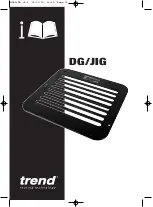
Please read these instructions carefully before use and retain for future reference.
•
Soldering Iron
•
User Manual
•
When using electrical appliances basic safety precautions should always be
followed.
•
This appliance is not intended for use by persons (including children) with reduced
physical, sensory or mental capabilities, or lack of experience and knowledge,
unless they have been given supervision or instruction concerning use of the
appliance by a person responsible for their safety.
•
Children shall not play with the appliance. Cleaning and user maintenance shall
not be made by children unless they are older than 8 and supervised.
•
Ensure that the soldering iron supply cord is kept away from heat or sharp edges
that could cause damage.
•
If the soldering iron supply cord is damaged, it must be replaced by a qualified
engineer in order to avoid injury or a hazard.
•
Ensure there is sufficient space and ventilation around the appliance to allow the
escape of heat and/or fumes.
•
Do not expose to rain or moisture.
•
Never place the product or part of it in water, or operate if your hands are wet.
•
Soldering work must be conducted on a stable, non-combustible surface.
•
Do not touch any metallic parts near the soldering tip.
WARNING:
This tool must be placed on it’s stand when not in use.
•
The iron must not be left unattended while it is powered on.
•
Do not use the appliance for any purpose other than that for which it is designed.
•
Do not use abrasives on the tip to remove oxide, only wipe the tip on a cleaning
sponge or wire pad.
APPLICATION & OPERATION
IMPORTANT SAFETY INFORMATION
WHAT’S INCLUDED
Note:
The first time you use the soldering iron, it may smoke slightly as the heating
element dries out. This is normal and should only last for a few minutes.
ONLY USE FOR ELECTRICAL WORK
- Acidic solder will damage the iron tip.
•
Allow the tip to fully heat up for approximately 45 seconds.
•
Set the required temperature using the controls on the desoldering station.
•
A lower temperature is recommended for quick cooling of soldered joints, less
dioxides and cleaner joints.






















